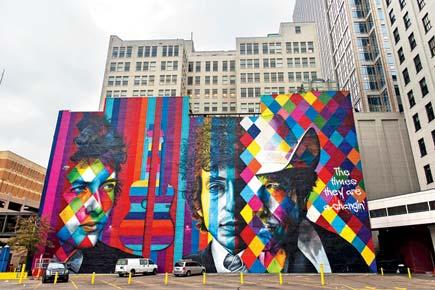Though I love Dylan and believe there ought to be no purist definition of literature, greater writers have been overlooked for the Nobel


Days after Bob Dylan was awarded the Nobel Prize in Literature, the songwriter’s home state Minnesota pays homage to him on Saturday with a mural designed by Brazilian artist Eduardo Kobra. Pic/AFP
ADVERTISEMENT
 I had listened to Nobel literature laureate Bob Dylan many times before, but it was one afternoon in the fall of 1982 that I heard him for the first time. A few friends and I drove back from Washington DC to Baltimore, Maryland, (to our university) and some of us had dropped acid (it was a strong dose of LSD). The driver (he’s still a friend, on Facebook and Instagram) put on a Dylan cassette — so many in our Class of ’85 were fans of Highway 61 Revisited — and it was just as the drug took effect that Mr Tambourine Man began playing. The repetitive strum-and-croon of each verse built around my head a spiral of sound; as if the song was a sound analogue of the mathematical puzzles of MC Escher’s woodcuts. It made Dylan sound like a wandering troubadour of medieval times; or like JS Bach’s harpsichord. Each line was religious; the song, deliverance. Ever since the Nobel Committee announced the award, the lyrics to Mr Tambourine Man have been pasted over and over again on the Great Wall of social media; still I must say that in my state, in the back of a Volkswagon Beetle as it climbed up Charles Street, I took literally the phrases “magic swirling ship”, “all my senses have been stripped”, “vague traces of skippin’ reels of rhyme” and “down the foggy ruins of time” (read up on LSD to know its powerful, psychedelic, hallucinatory effect). Dylan’s influence on the woodcut of my mind was not insignificant.
I had listened to Nobel literature laureate Bob Dylan many times before, but it was one afternoon in the fall of 1982 that I heard him for the first time. A few friends and I drove back from Washington DC to Baltimore, Maryland, (to our university) and some of us had dropped acid (it was a strong dose of LSD). The driver (he’s still a friend, on Facebook and Instagram) put on a Dylan cassette — so many in our Class of ’85 were fans of Highway 61 Revisited — and it was just as the drug took effect that Mr Tambourine Man began playing. The repetitive strum-and-croon of each verse built around my head a spiral of sound; as if the song was a sound analogue of the mathematical puzzles of MC Escher’s woodcuts. It made Dylan sound like a wandering troubadour of medieval times; or like JS Bach’s harpsichord. Each line was religious; the song, deliverance. Ever since the Nobel Committee announced the award, the lyrics to Mr Tambourine Man have been pasted over and over again on the Great Wall of social media; still I must say that in my state, in the back of a Volkswagon Beetle as it climbed up Charles Street, I took literally the phrases “magic swirling ship”, “all my senses have been stripped”, “vague traces of skippin’ reels of rhyme” and “down the foggy ruins of time” (read up on LSD to know its powerful, psychedelic, hallucinatory effect). Dylan’s influence on the woodcut of my mind was not insignificant.
One of my favourite biopics is not really a traditional biopic: I’m Not There is ‘inspired’ by the songs and the life of Bob Dylan, and six different actors (including Cate Blanchette) play the Dylan-character. The film is a kaleidoscope that is Dylan: each time you turn it, or shake it, you get a different configuration of the man. The names of the six characters give a sense of what Dylan is: a combination of, among others, Arthur Rimbaud, Woody Guthrie, and Billy the Kid. It’s not a film that many can watch, because it isn’t like a story that most are used to — yet if you listen to a Bob Dylan album or two before a viewing, you will no doubt get it.
When I returned to the National Capital Region from Mumbai in 2013, a friend asked me to be the moderator for a lecture he was to deliver on Dylan at the India International Centre. The IIC is associated with the old and crusty and is hardly the place for a Dylan lecture, though it is true that it dealt mostly with Dylan before 1970 (and it is now nearly half a century later). I don’t really care for Dylan in his Born Again phase, and during the lecture I deliberately harassed the friend by asking him to dissect Lay Lady, Lay which, though tuneful, is probably not what the Nobel Committee members were humming while deliberating on the Prize.
Allow this column to momentarily digress from Dylan. Yesterday my essay was published elsewhere, evaluating the still-young writer Siddharth Chowdhury (PanMacmillan has reissued his first three books in a single volume called Ritwik and Hriday). He is the most underrated writer in India. What I admire about his work is its Chekhovian quality —its effortless simplicity, the polished sentence-gems, and the closed world in which adventures overlap while you dig deeper with each character. He is like another Chekhovian writer, RK Narayan, arguably modern India’s greatest writer. Narayan’s prose is deceptively simple but unearths deeper truths about the human condition, in the fictional world of Malgudi. Narayan never won the Nobel; he, more than many, deserved it and even had his champions in the influentials at the Hindu. And even Salman Rushdie, who undoubtedly sobs bitterly once a year when the Prize is announced, tipped his hat to Anton Chekhov with a flourish, by part-naming his third-person masterful autobiography Joseph Anton after the great Russian writer.
So, while many middle-aged, middle-class Indians behave as if Dylan’s winning the Nobel is the best Pujo gift that they have received; and though I love Dylan; and though it’s not a big deal if Leonard Cohen was edged out by Dylan for the Prize; and though I love rock music (Richard Ashcroft of The Verve is to the 1990s what Dylan was to the ’60s); and though I agree that there ought to be no purist definition of literature, or what deserves an award; and though the Nobel literature isn’t a big deal because it wasn’t given to Chekhov, Narayan, Leo Tolstoy, or Jorge Luis Borges (also, in any given year no one remembers who won it two years earlier); I must humbly say only one thing: Dylan is no Chekhov.
Senior journalist Aditya Sinha is a contributor to the recently published anthology House Spirit: Drinking in India. He tweets @autumnshade. Send your feedback to mailbag@mid-day.com
 Subscribe today by clicking the link and stay updated with the latest news!" Click here!
Subscribe today by clicking the link and stay updated with the latest news!" Click here!






